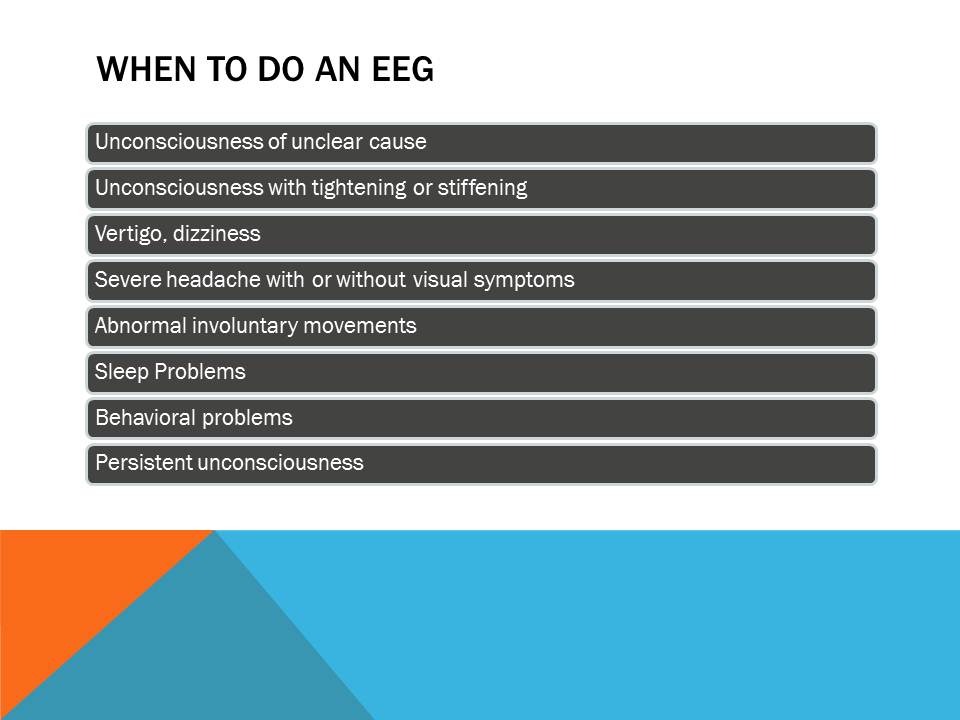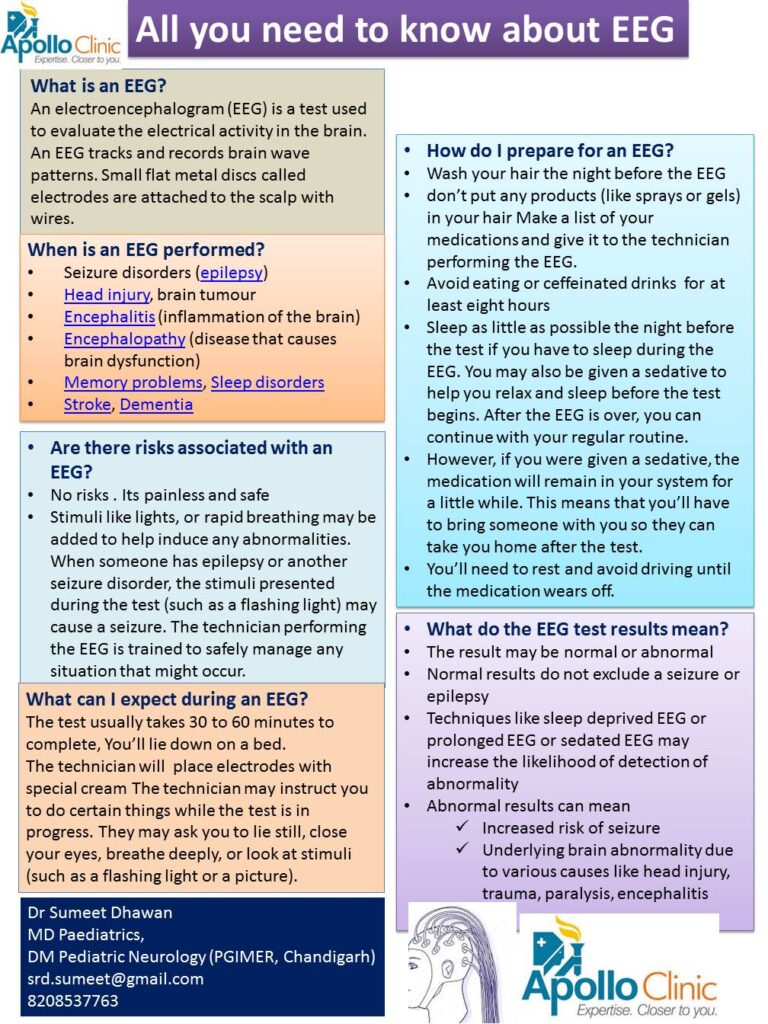EEG test in Chandigarh Panchkula and Mohali


What is an EEG test?
An electroencephalogram (EEG) is a test used to evaluate the electrical activity in the brain. The test is similar to ECG of heart, in which ECG electrodes are placed on chest. In a similar way, electrodes are applied on head with a paste in the EEG test
An EEG test tracks and records brain wave patterns. Small flat metal discs called electrodes are attached to the scalp with wires.
When is an EEG test performed?
- Seizure disorders (epilepsy)
- Head injury, brain tumor
- Encephalitis(inflammation of the brain)
- Encephalopathy(disease that causes brain dysfunction)
- Memory problems, sleep disorders
- Stroke, Dementia
- Poor attention, poor concentration
- Seeing flashes of lights and colours in headache and vertigo
Are there risks associated with an EEG etest?
- No risks. Its painless and safe
- Stimuli like lights, or rapid breathing may be added to help induce any abnormalities. When someone has epilepsy or another seizure disorder, the stimuli presented during the test (such as a flashing light) may cause a seizure. The technician performing the EEG is trained to safely manage any situation that might occur.
What will happen in EEG test and what can I expect during an EEG?
- The test usually takes 30 to 60 minutes to complete, you’ll lie down on a bed.
- The technician will place electrodes with special cream The technician may instruct you to do certain things while the test is in progress. They may ask you to lie still, close your eyes, breathe deeply, or look at stimuli (such as a flashing light or a picture).
What preparation are needed before EEG test?
- Wash your hair the night before the EEG test
- don’t put any products (like sprays or gels) in your hair Make a list of your medications and give it to the technician performing the EEG test.
- Avoid eating or caffeinated drinks for at least eight hours
- Sleep as little as possible the night before the test if you have to sleep during the EEG test. You may also be given a sedative to help you relax and sleep before the test begins. After the EEG test is over, you can continue with your regular routine.
- However, if you were given a sedative, the medication will remain in your system for a little while. This means that you’ll have to bring someone with you so they can take you home after the test.
- You’ll need to rest and avoid driving until the medication wears off.
What do the EEG test results mean?
- The result may be normal or abnormal
- Normal results do not exclude a seizure or epilepsy. Your neurology doctor might sometimes preescrobe anti-seizure medication even if the EEG is normal, based on risk assessment
- Techniques like sleep deprived EEG or prolonged EEG or sedated EEG may increase the likelihood of detection of abnormality
- Abnormal results can mean
- Increased risk of seizure
- Underlying brain abnormality due to various causes like head injury, trauma, paralysis, encephalitis
Is the EEG test safe?
The test is absolutely safe. There is no injection or pain involved
Is sedation safe for EEG test?
Children who are not co-operative need oral sedation. This is not same as anaesthesia. Oral sedation will help the person to sleep. The person will wake up if you touch him or press him. In anaesthesia, person will not wake up even with pain of needle. The person will sleep for 1-6 hours after sleep or sometimes more. If you are in doubt, just pinch and wake up the person.
What are different types of EEG test?
There are different types of EEG test
Awake EEG- of least clinical value. Usually done for patients who are in hurry to do the test on same day and want quick results. The results of awake EEG are usually normal. Normal EEG will complicate the treatment process rather than help in treatment
Sleep deprived EEG-The person sleeps two hours late, and gets up 3 hours early in morning. Can eat breakfast before EEG, but not tea or coffee
Sleep EEG + Awake EEG- is done for children needing both sleep and awake EEG. In children who are unlikely to co-operate, sleep EEG is done first and then awake EEG may be tried. Awake EEG is very difficult in children
Awake+ sleep EEG test- For adults whom sleep EEG is needed. The person is advised oral sedative and EEG test is started. During the process, the person does on to sleep and sleep EEG is also recorded
Prolonged EEG- for 1- 6 hours- This EEG is usually a sleep EEG in which all sleep stages are expected to be captured
Video EEG short- for 30-60 min- This is done in person will multiple daily seizures and where suspected events are non- seizure. When the suspected abnormal events are seizures, video EEG may or may not be necessary. In such a case, video EEG may help in localising the seizure onset which is usually needed for epilepsy surgery planning. Such EEG is done by neurologist with expertise in electrophysiology
Overnight Video EEG test for 12 -72 hours- not available currently anywhere in private hospitals in Chandigarh. This EEG is done in localising the seizure onset which is usually needed for epilepsy surgery planning.
Can EEG test and MRI test be done on same day?
For adults who don’t need sedation, both the test can be done on same day
For children who need sedation, attempt can be made for both EEG test and MRI test in one day. This may or may not be successful as the effect of oral sedation is only 30-60min. Proper planning can make this successful. As soon as the EEG test starts, inform the MRI centre that sedated child will come for MRI after 30 min. MRI centres in our clinic give priority for children who are sedated. Sometimes, in poorly co-operative and hyperactive children, where is effect of sedation is short lasting, the test needs to be done on separate days.
Be prepared that in some children, sedation with oral sedation may not be successful. So, you may have to go for test for 2-3 times
EEG test cannot be done under anaesthesia. EEG test should not be done if MRI test is done under anaesthesia
Can EEG test and BERA/VEP test be done on same day?
The total duration for both this test is 1-1.5 hours
For adults who don’t need sedation, both the test can be done on same day
For children who need sedation, attempt can be made for both EEG test and BERA/VEP test in one day. This may or may not be successful as the effect of oral sedation is only 30-60min. Proper planning can make this successful. Sometimes, in poorly co-operative and hyperactive children, where is effect of sedation is short lasting, the test needs to be done on separate days
How long does it take to get the EEG test report?
We provide EEG test report by next day 10am. You do not have to come to the clinic for that. The report can be sent on email if you give the email address at the time of test. The hard copy can be collected from clinic reception after you have received the email
Pls keep in mind that those clinic who provide early reports are the reports seen by technician only and not the neurologist. All neurologist are busy in OPD and only see the EEG test only after the OPD is over.
So kindly do not insist for early reports if you want good quality report. Please note that EEG test report is never an emergency. The treatment of neurological condition is based on clinical condition, rather than EEG test. EEG test may help in modification of treatment. EEG test doesn’t help initiation of report
What are timings of EEG test?
EEG test is available in our Chandigarh clinic from Monday to Saturday from 8am-4pm for adults and 8am to 3pm for children (as children need extra time to sleep with oral sedation.
We also provide EEG test in Yamunanagar in GABA Hospital from 8am to 4pm
